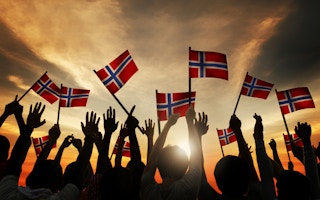Norway is a leader in funding forest conservation around the world (see here, here, and here, for example), and has also taken a stand for the human rights of forest communities. But now the country has announced that it will walk the walk itself.
In what’s being hailed as a groundbreaking move, the Norwegian parliament pledged yesterday that the government’s public procurement policy will be going deforestation-free.
The Rainforest Foundation Norway, which has worked for a number of years to secure a zero deforestation commitment from the Norwegian government in regard to its supply chains, said in a statement that “Norway is the first country in the world to commit to zero deforestation in its public procurement.”
The Norwegian parliament’s Standing Committee on Energy and the Environment made the pledge in a recommendation on the government’s Action Plan on Nature Diversity. The Committee requested in the recommendation that the government “impose requirements to ensure that public procurements do not contribute to deforestation of the rainforest.”
Further details on what those requirements will actually entail will have to be elaborated upon by the government as a follow-up to the decision made today by the parliament, according to Rainforest Foundation Norway.
The Standing Committee on Energy and the Environment also requested that the government address the need to protect biodiversity through the investments made by Norges Bank Investment Management, which manages Norway’s Government Pension Fund Global, and that a separate policy for biodiversity be developed.
“
Norway is the first country in the world to commit to zero deforestation in its public procurement.
Nils Hermann Ranum, Rainforest Foundation Norway
Today’s announcement would seem to make good on a joint declaration Norway issued with Germany and the UK at a UN climate summit in New York in September 2014, which stated the three countries’ intention to “promote national commitments that encourage deforestation-free supply chains, including through public procurement policies to sustainably source commodities such as palm oil, soy, beef and timber.”
The global trade in agricultural commodities has become an increasingly important driver of tropical deforestation. A December 2015 study found that, between 2000 and 2011, the production of beef, palm oil, soy, and wood products (including timber and pulp and paper) in just seven countries with high deforestation rates (Argentina, Bolivia, Brazil, Paraguay, Indonesia, Malaysia, and Papua New Guinea) was responsible for 40 per cent of total tropical deforestation and 44 per cent of associated carbon emissions.
Rainforest Foundation Norway’s Nils Hermann Ranum said Norway’s pledge to go deforestation-free was an important victory in the fight to protect rainforests and called on other countries to follow Norway’s lead by adopting similar zero deforestation commitments, particularly Germany and the UK, given their joint statement at the UN Climate Summit.
“Over the last few years, a number of companies have committed to cease the procurement of goods that can be linked to destruction of the rainforest,” Ranum said in a statement.
“Until now, this has not been matched by similar commitments from governments. Thus, it is highly positive that the Norwegian state is now following suit and making the same demands when it comes to public procurements.”
This story is republished with permission from Mongabay.










